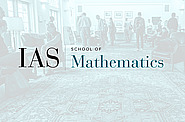Seminars Sorted by Series
SL2 Seminar
Oct
20
2020
SL2 Seminar
Representations of GL_2(F_q) in defining characteristic: a number-theorist's perspective
Matthew Emerton
5:00pm|Remote Access
Nov
03
2020
Nov
24
2020
Dec
15
2020
Jan
19
2021
SL2 Seminar
A categorical approach to representations in defining characteristic
3:00pm|Remote Access
Jan
26
2021
Feb
02
2021
Mar
09
2021
Mar
16
2021
SL2 Seminar
Microlocal sheaves II: morphisms, microperverse sheaves and regular singularities
Michael McBreen
6:00pm|Remote Access
Mar
23
2021
SL2 Seminar
Microlocal sheaves III: Regular singularities and Riemann-Hilbert
Michael McBreen
6:00pm|Remote Access
Apr
13
2021
Apr
20
2021
Apr
27
2021
May
11
2021
Special Analysis Seminar
May
08
2015
Special Analysis/Number Theory Seminar
Feb
08
2016
Special Analysis/Number Theory Seminar
Variance of sums of arithmetic functions over primes in short intervals
Jon Keating
4:30pm|S-101
Special Analysis/Probability Seminar
Feb
10
2009
Special Computer Science/Discrete Mathematics Lecture
Feb
23
2012
Special Computer Science/Discrete Mathematics Lecture
Zero Knowledge Proofs and Nuclear Disarmament
1:30pm|S-101
Feb
23
2012
Mar
20
2012
Special Computer Science/Discrete Mathematics Lecture
Graph Convergence, Parameter Testing and Group Actions
Miklos Abert
3:15pm|S-101
Apr
09
2012
Special Computer Science/Discrete Mathematics Lecture
Random Local Algorithms
Endre Csoka
11:15am|S-101
Special Computer Science/Discrete Mathematics Seminar
Oct
20
2008
Special Computer Science/Discrete Mathematics Seminar
k-Wise Independent Random Graphs
Asaf Nussboim
4:00pm|S-101
Nov
24
2008
Special Computer Science/Discrete Mathematics Seminar
Quantum Algorithms Using the Curvelet Transform
Yi-Kai Liu
4:00pm|S-101
Dec
08
2008
Special Computer Science/Discrete Mathematics Seminar
Cutoff Phenomena for Random Walks on Random Regular Graphs
Eyal Lubetzky
4:00pm|S-101
Feb
06
2020
Special Computer Science/Discrete Mathematics Seminar
Explicit rigid matrices in P^NP via rectangular PCPs
Prahladh Harsha
2:00pm|Simonyi 101
Special Computer Science/Discrete Mathematics Seminar I
Jul
11
2006
Special Computer Science/Discrete Mathematics Seminar I
The learnability of Quantum States
11:00am|S-101
Special Computer Science/Discrete Mathematics Seminar III
Apr
13
2005
Special Computer Science/Discrete Mathematics Seminar III
Linear-Degree Extractors and the NP-Completeness of Approximating Clique and Chromatic Number
11:15am|S-101
Special Dynamics Seminar
Oct
11
2019
Special Dynamics Seminar
On Radon measures invariant under horospherical flows on geometrically infinite manifolds.
Or Landesberg
2:00pm|Simonyi Hall 101
Nov
15
2019
Special Dynamics Seminar
Effective bounds for the least solutions of homogeneous quadratic Diophantine inequalities
Thomas Hille
2:00pm|Simonyi Hall 101
Nov
22
2019
Special Dynamics Seminar
On some consequences of exponential mixing
Federico Rodriguez-Hertz
2:00pm|Simonyi Hall 101
Special Eyjafjallajökull Seminar
Special Geometric PDE Seminar
Jan
23
2009
Special Geometric PDE Seminar
Local Polyhomogeneity and Unique Continuation for Einstein Metrics
Olivier Biquard
11:00am|S-101
Mar
23
2009
Special Geometry of Materials Seminar
Nov
20
2009
Special Geometry of Materials Seminar
What does the Modular Group Have to do With Materials?
4:00pm|S-101
Dec
04
2009
Special Geometry of Materials Seminar
Using Betti Numbers to Quantify Complicated Time Dependent Patterns
Konstantin Mischaikow
2:00pm|S-101
Special Geometry/Dynamical Systems Seminar
Jan
20
2010
Special Geometry/Dynamical Systems Seminar
Using Dvir's Polynomial Method in Euclidean Space
2:00pm|S-101
Jan
21
2010
Special Geometry/Dynamical Systems Seminar
Contraction of Areas and Topology of Mappings
4:30pm|S-101
